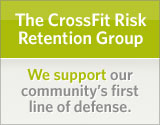My friend is a genius with data organization & categorization and gave me some interesting things to ponder regarding defining and qualifying health/fitness etc. One of the many things we discussed was how you take something as complex as the human body and quantify what it means to be healthy, fit, etc.
My friend's expertise is in taking complex variables - data - and turning them into something useful - information. Isn't that really what's needed when we discuss health in general? Taking the mass of data generated from nutrition and fitness lab studies, cohort studies, corelational studies, etc., and figuring out how any of that may or may not apply to a system as complex as the human body?
To get any value from the data, we need to know how it affects health. But first, we need to figure out what health is. So that's what it comes down to -- what is health? How do we define it? How do we measure it?
On the surface, there seem to be a whole lot of ways to measure health. There's quick-and-dirty methods like height-weight charts or BMI calculations, and slightly more involved measures like blood pressure and cholesterol readings or body composition analyzes. There's really expensive stuff like whole body CT scanning, which may be valid preventative medicine but is more likely just be a nifty, expensive toy.
All these things are valuable (except perhaps the height-weight charts) and are doubtless useful in demonstrating something but by themselves these measures cannot tells us whether or not a person is healthy.
Case in point: would you say this girl is healthy? Or would you say she's in need of a diet and should probably get to the gym a bit more? Let's say you saw her at the mall. What would you think? C'mon, be honest.

Ok, now would you think differently if you saw her up on an Olympic's platform, recieveing a bronze medal? This girl is Cheryl Haworth, bronze medalist and world class athlete in the 75+ kilo division of Olympic Weightlifting. At 5'9" and 315 pounds, Cheryl's height-weight and BMI measures would read: obese. In fact, with a BMI of 46, Cheryl is so far into the "morbidly obese" category that her doctor, if he didn't know better, would probably be freaking out about her compromised health.
But with her 75 bpm resting heart rate, 28-30% body fat composition (this is a healthy body fat percentage for woman, by the way), 30" vertical leap, 495 pound squat and ability to do the splits (both directions) I can tell you that Cheryl is way fitter than you or I: she is stronger, more coordinated and more flexible.
So with her BMI of 46, is Cheryl healthy? Well, she's sure as shit healthier than most of us. There are tremendous risks associated with generalizing from BMI statistics (or any other single-point measurement) because athletes like Cheryl will come along and make you look like an idiot.
Coach Greg Glassman, founder of Crossfit (my training program of choice), looked at a closely related question, "What is fitness?" Glassman was unable to find any satisfactory and applicable answer to this question. Most of the glorified "fittest" athletes were long endurance specialists, ironman triathletes and marathoners and long distance cyclists.
These athletes are indeed fit--hey, if you can run Boston you're an athlete in my book--but societally, why do we define fitness based on one's ability to run or bike ungoddly distances in one go? Why is that a better benchmark than your ability to lift ungoddly amounts of weight in one go? If one measure isn't inherently better, then (culturally glorified phenotypes notwithstanding) there's really no reason to think Lance Armstrong is an inherently better athlete than Cheryl Haworth, is there?
Glassman, looking at this and many other related issues, came to this conclusion:
"There are ten recognized general physical skills. They are cardiovascular/respiratory endurance, stamina, strength, flexibility, power, speed, coordination, agility, balance, and accuracy. You are as fit as you are competent in each of these ten skills. A regimen develops fitness to the extent that it improves each of these ten skills."
So these are the terms of a new fitness standard that does not glorify Cardio Uber Alles. These terms led Glassman to define fitness in a new way. Concise, scalable and all-inclusive...the Crossfit 30 Second Elevator Speech, if you will:
"Increased work capacity across broad time and modal domains."
So there is it. Crossfit has defined fitness - "work capacity across broad time and modal domains." To the degree that you can get more work done in less time across the ten recognized skills in any combination they might occur, you are getting fitter.
What can this definition of fitness tell us about a definition of health? The current de facto definition of health is, "not sick" but I think it is clear that an absence of sickness is not the same thing as a preponderance of health. Does the absence of Type II diabetes, cancer or high blood pressure mean someone is healthy, even if they are a stressed, sedentary, chronically sleep-deprived smoker who lives on twice-a-day McDonalds, rarely eats a vegetable and has painful battles with constipation?
Luckilly for me, Glassman has recently turned his attention to this topic. If you accept that increased work capacity across broad time and modal domains is a good way to measure general fitness, then you can define health as "work capacity across broad time and modal domains, sustained over a lifetime." In otherwords, you are healthy to the degree that you are broadly fit over a lifetime.
This definition is clearly a starting point, but it is a good starting point. It allows for sickness in as much as sickness will impact one's work capacity, but is not defined by sickness.
It says, if at 40 you can perform the same work, in the same time frame, at the same intensity that you performed when you were 30, then maybe a few point bump in your cholesterol isn't that critical when assessing your overall health.
It says, if you gave up marathoning but gained the ability to sprint, lift heavy, jump, swing, pull-up and walk on your hands then maybe gaining 15 pound in the process was good for your health.
It says, define your health based on what you can do now, what you could do then and what you will do later. Look at the delta and see where you are. Look at your work capacity across broad time and modal domains to assess your fitness; look at your fitness over time to assess your health.
It is my belief that actions based on improving work capacity across broad time and modal domains, over a lifetime, will lead to increased health measured via almost any other metric. When I went in for my physical, my doctor said my resting heart rate (46) was, "like a marathoners," I joked back, "yeah but without the joint problems and soft tissue damage." I'm not trying to slag on marathoners here, but my doctor's comment goes to the heart of the Cardio-centric view of fitness, and therefore health.
I propose we start talking about health within the context of this new, broad, inclusive definition, and see where it takes us.








No comments:
Post a Comment